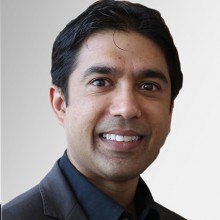Computational Imaging with Few photons, or Ions
LIDAR systems use single-photon detectors to enable long-range reflectivity and depth imaging. By exploiting an inhomogeneous Poisson process observation model and the typical structure of natural scenes, first-photon imaging demonstrates the possibility of accurate LIDAR with only 1 detected photon per pixel, where half of the detections are due to (uninformative) ambient light. I will explain the simple ideas behind first-photon imaging. Then I will touch upon related subsequent works that mitigate the limitations of detector arrays, withstand 25-times more ambient light, allow for unknown ambient light levels, and capture multiple depths per pixel. The philosophy of modeling at the level of individual particles is also at the root of current work in scanned ion beam microscopy.

Dr. Vivek Goyal, Ph.D.
Associate Professor, Boston University on September 7, 2018 at 11:45 AM in EB2 1230
Vivek Goyal received the M.S. and Ph.D. degrees in electrical engineering from the University of California, Berkeley, where he received the Eliahu Jury Award for outstanding achievement in systems, communications, control, or signal processing. He was a Member of Technical Staff at Bell Laboratories, a Senior Research Engineer for Digital Fountain, and the Esther and Harold E. Edgerton Associate Professor of Electrical Engineering at MIT. He was an adviser to 3dim Tech, winner of the 2013 MIT $100K Entrepreneurship Competition Launch Contest Grand Prize, and consequentlywithNestLabs2014-2016. HeisnowanAssociateProfessorofElectrical and Computer Engineering at Boston University.
Dr. Goyal is a Fellow of the IEEE. He was awarded the 2002 IEEE Signal Processing Society (SPS) Magazine Award, the 2017 IEEE SPS Best Paper Award, an NSF CAREER Award, and the Best Paper Award at the 2014 IEEE International Conference on Image Processing. Work he supervised won student best paper awards at the IEEE Data Compression Conference in 2006 and 2011 and the IEEE Sensor Array and Multichannel Signal Processing Workshop in 2012 as well as the Best Poster Award at the IEEE International
The Department of Electrical and Computer Engineering hosts a regularly scheduled seminar series with preeminent and leading reseachers in the US and the world, to help promote North Carolina as a center of innovation and knowledge and to ensure safeguarding its place of leading research.
